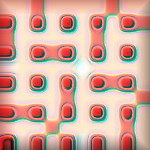Brainsteem #6 Prize Maths Puzzle [Win 2SBD+1SBD]

Firstly, remember that there are TWO prizes, so anybody can win the random prize!
Slowly, slowly, let's start to make these Brainsteem Prize Maths Puzzles a bit tougher!
There are not many solutions, but you also need to prove that you have all of them.
Find all pairs of positive integers (n, k) such that n! = (n + 1)k - 1.

image: designed myself
The Prizes
Earnings from each Brainsteem Puzzle will go towards the next Prizes.
For this Brainsteem # 5 the Prizes are:
2 SBD for the first correct answer that includes a valid method
1 SBD for one other correct answer that will be chosen randomly. That means you can still win this prize even if the answer may already be visible!
Please upvote! Resteem if you think this is a great puzzle! I will upvote all correct answers and any other interesting comments. To be fair to everyone, the prize closes after 7 days. Winners will be notified after that date and usernames posted with a solution.
Enjoy!
first we expand (n+1)^k-1 .......
Oh..wow I can't see the relationship with n! at all
Let's use excel instead >_>
OK ...../____\
the answer is (1,1), (2,1), (4,2) /____.........
This is nearly over.
Any new solutions?
Remember that the second prize is random, so anybody can add their soluton (and don't forget to upvote to enter) - so long as you believe any of the current answers are correct, of course! ;-)
There is actually quite an elegant proof to this, but I shall give it after the competition ends.
dang....it's too hard for me, I tried to solve it analytically :(
Why you look so down?
You're our only winner for this Brainsteem.
Another 2 SBD making its way to you.
haha coz I cannot solve it analytically XD
Thank you for your SBD ^_^~
Too hard for me! Posting to follow. Upvoting, too.
I don't understand the photo. Is it the real puzzle or the question : Find all pairs of positive integers (n, k) such that n! = (n + 1)k - 1. please reply.
What photo? The red cellular automata image? That's not part of the question, it's an approximate colour-coding of difficulty for a high school student.
i got (1,1) but i gave up b/c i had to do it manually. I didnt finish thinking of the process to compute the possibilities. But this is what i figured out. The opposite of n! would be to divide the resulting number by 2 and then 3 and so on until you match the numbers and find the n!. Now i couldn't figure out how to solve the expression with this though. If i gave out too much of a hint just let me know and ill remove it. But it might not make much of a difference either way.
P.S. this needed some attention so i did a few things, maybe some peeps will participate.